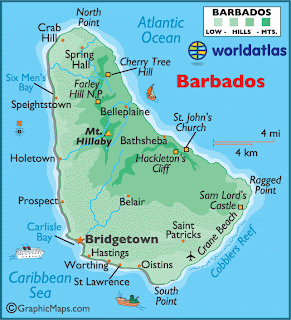 |
| map of Barbados |
That's the world of Barbados - everyone is either a Bajan or a tourist. Those of us who lived on the island because our work took us there were always being mistaken for being tourists. And that meant every time we walked down the street, Bajan taxi drivers would stop us to ask if we needed a ride, even if they watched as we got out of the car we had just parked on the same street.
 |
| image of tourists by Holidayextras, via Flickr.com |
Within our first week of moving into the house, we met a couple from the British High Commission whose son was in the same class as our son. They invited us to join them at a birthday party the following weekend, to observe the 40th birthday of two members of the High Commission staff. We were pleased to go to the party where we met a number of couples, each one of which had at least one unhappy member. The party also served as a farewell party for a couple who were leaving Barbados after completing a four-year-tour with the High Commission. That couple kept making the rounds telling each of us to give it some time, assuring us that we would eventually come to enjoy ourselves in Barbados like they did.
 |
| image of open air market in Barbados by David Berkowitz, via Flickr.com |
At counters where people lined up to get service, such as in a pharmacy, the staff behind the counters seemed to give preference to Bajan customers, the people they knew, making the tourists wait to one side. This disregard for the order that customers arrived annoyed most westerners, probably including some tourists, although the tourists would be gone soon so there was little reason to be concerned about annoying them.
What was the most difficult for me to get used to in Barbados was the directness of Bajans when they spoke to strangers. In addition to taxi drivers approaching us to ask if we wanted a ride and the panhandlers who approached us to ask for a handout, people did not hesitate to walk up to a stranger to tell the stranger what to do to fix a problem. "Fix your slip," or "Tie your shoelaces," were common pieces of advice passed from Bajan to someone else, ever annoying westerners who were more accustomed to strangers pointing out that a problem exists, as in "Your slip is showing" or "Your shoelaces are untied," instead of being told what to do about it.
One day in the consular section, as I interviewed Bajan visa applicants, a young woman walked up to my interview window with a button on her blouse unbuttoned. It gave me great pleasure to tell her what to do to fix the problem. "Button your blouse," I said, knowing that she thought I was being polite while I knew I was exercising my annoyance with this Bajan pattern by being as impolite as I knew I could get away with.
No comments:
Post a Comment